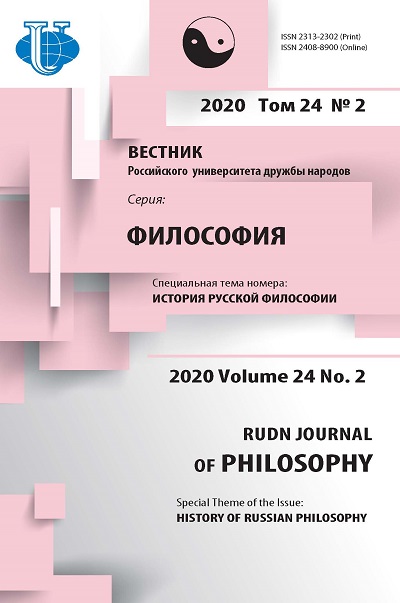L.N. Tolstoy's Principle of “Non-Resistance to Evil by Violence” in the Context of Russian Religious Philosophy of the Late XIX - Early XX Century
- Authors: Evlampiev I.I.1, Matveeva I.Y.2
-
Affiliations:
- St. Petersburg State University
- Russian State Institute of Performing Arts
- Issue: Vol 24, No 2 (2020): HISTORY OF RUSSIAN PHILOSOPHY
- Pages: 165-180
- Section: HISTORY OF RUSSIAN PHILOSOPHY
- URL: https://journals.rudn.ru/philosophy/article/view/23673
- DOI: https://doi.org/10.22363/2313-2302-2020-24-2-165-180
- ID: 23673
Cite item
Full Text
Abstract
The article discusses how the meaning of the principle of “non-resistance to evil by violence” was changing in L.N. Tolstoy's religious and philosophical teachings and how this principle was evaluated in Russian religious philosophy of the late XIX - early XX century. In the first version of Tolstoy’s teachings, set forth in the book “What is my faith?”, the principle of non-resistance was understood in a moral sense, as the norm for all people; its execution should lead to the perfection of earthly life. This idea of L. Tolstoy was sharply criticised by his contemporaries, who noted that there was no truly religious content in Tolstoy’s teachings, it was turning into a utilitarian doctrine of the earthly progress of mankind. Given this criticism, Tolstoy in his later works changed his understanding of the principle of non-resistance. Drawing a distinction between two levels of human life - “animal” and divine, Tolstoy recognised the principle of non-resistance to the law as the divine life of a man. As a result, the principle of non-resistance has acquired a religious rather than moral meaning, since the transition of a man to a divine life means a mystical transformation of his being. He is aware of his super-spatial and super-temporary unity with all people and with all being, and therefore can evaluate the consequences of his actions not only in the limited sphere of his life, but also in all infinite being. In this regard, a person realizes the absolute superiority of good deeds over evil, even if the latter are committed to confront evil. It is shown that some critics of Tolstoy came to a similar understanding of the religious meaning of the principle of non-resistance at the end of their lives (N.A. Berdyaev, L.P. Karsavin).
About the authors
I. I. Evlampiev
St. Petersburg State University
Author for correspondence.
Email: yevlampiev@mail.ru
Sc. in Philosophy, Professor, Institute of Philosophy
5, Mendeleevskaya liniya, St. Petersburg, Russian Federation, 199034I. Yu. Matveeva
Russian State Institute of Performing Arts
Email: inga.matveeva.spb@gmail.com
Ph.D. in Philology, Associate Professor at the Theatrical department
34, Mokhovaya St., St. Petersburg, Russian Federation, 191028References
- Tolstoy LN. What is my faith? (My religion). Tolstoy LN. Complete Works in 90 vols. Vol. 23. Moscow: Belles-lettres; 1957. P. 304—465. (In Russian).
- Berdyaev NA. The Old and New Testaments in the religious consciousness of L. Tolstoy. L.N. Tolstoy: pro et contra. The personality and work of Leo Tolstoy in the assessment of Russian thinkers and researchers. St Petersburg: RHGA Publ.; 2000. P. 243—263. (In Russian).
- Rozanov VV. More about gr. LN. Tolstoy and his doctrine of non-resistance to evil. L.N. Tolstoy: pro et contra. P. 264—273. (In Russian).
- Tolstoy LN. About life. Tolstoy LN. Complete Works in 90 vols. Vol. 26. Moscow: Belles-lettres, 1936. S. 313—442. (In Russian).
- Guseynov AA. Non-violence as the truth of life. Experience of non-violence in the XX century. Socio-Ethical Essays. Ed. by RG. Apresyan. Moscow: Aslan; 1996. P. 236—264.
- Tolstoy LN. Diaries (1901—1903). Tolstoy LN. Complete Works in 90 vols. Vol. 54. Moscow: Belles-lettres; 1935. S. 2—203. (In Russian).
- Tolstoy LN. Diaries (1904—1906). Tolstoy LN. Complete Works in 90 vols. Vol. 55. Moscow: Belles-lettres; 1937. S. 2—292. (In Russian).
- Tolstoy LN. Diaries (1895—1899). Tolstoy LN. Complete Works in 90 vols. Vol. 53. Moscow: Belles-lettres; 1953. P. 2—235. (In Russian).
- Gelfond ML. L.N. Tolstoy — moral thinker. Materials of the international scientific conference “Tolstoy Readings — 2016”. Moscow: RG-Press; 2017. P. 203—211. (In Russian).
- Tolstoy LN. Way of life. Tolstoy LN. Complete Works in 90 vols. Vol. 45. Moscow: Belles-lettres; 1956. P. 12—496. (In Russian).
- Dostoevsky FM. Demons. Dostoevsky FM. Complete Works in 30 vols. Vol. 10. Leningrad: Science; 1974. 517 p. (In Russian).
- Berdyaev NA. Russian idea. The main problems of Russian thought of the XIX century and the beginning of the XX century. About Russia and Russian philosophical culture. Philosophers of Russian post-October emigration. Moscow: Science; 1990. P. 43—271. (In Russian).
- Karsavin LP. Church, personality and state. Karsavin LP. Works. Moscow: Rarity; 1993. P. 403—442. (In Russian).
- Karsavin LP. On the essence of Orthodoxy. Karsavin LP. Works. P. 359—402. (In Russian).
- Matveeva IYu, Evlampiev II. L. Tolstoy's religious doctrine and L. Karsavin's concept of personality. Soloviev studies. 2019. No. 3. P. 150—161. (In Russian).
- Evlampiev II. Leo Tolstoy and the search for true Christianity in Russian philosophy. Philosophical sciences. 2018. No. 8. P. 90—107. (In Russian).
Supplementary files















